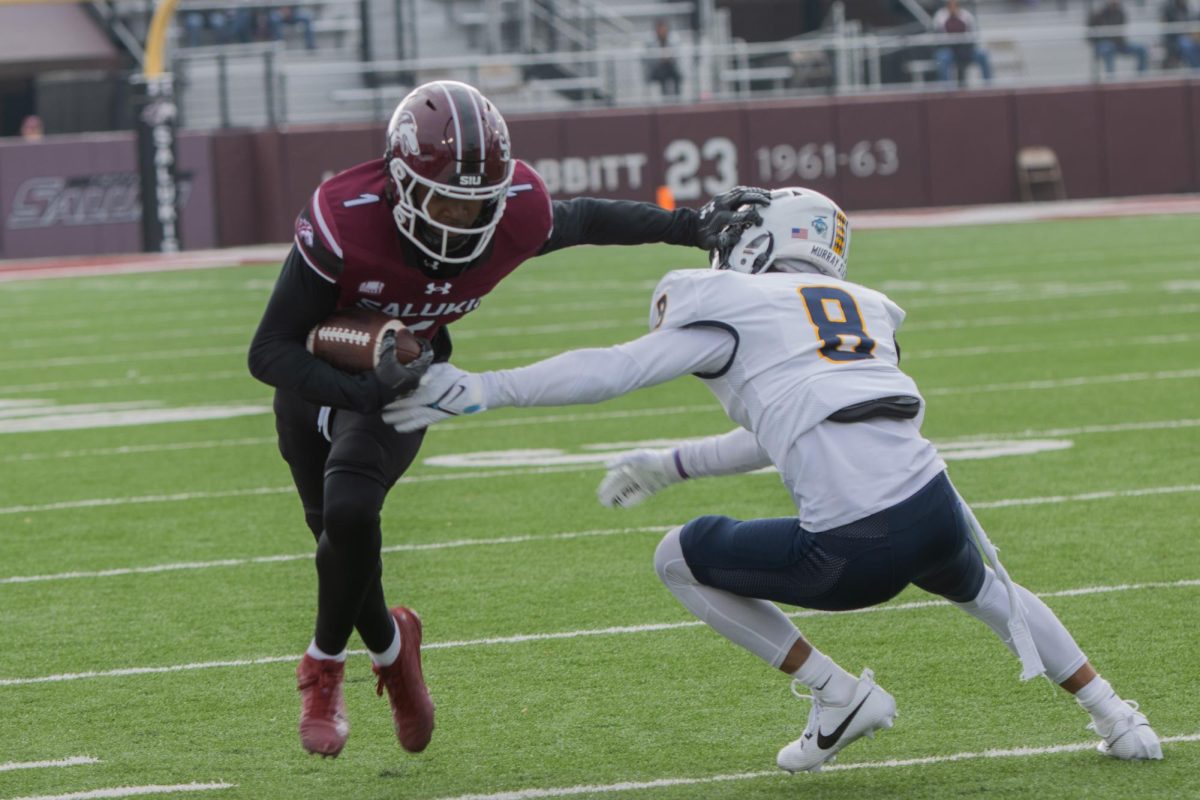Professionals promote child-abuse awareness
November 25, 2013
When a medical professional sees a child for an injury, they are not always diagnosed correctly and often return home only to continually be exposed to violence or other abuse.
Child-abuse advocates at SIU and in southern Illinois are reaching out to make a difference in the lives of victims and survivors of child abuse.
According to numbers released in 2012 from the Department of Children and Family Services in Illinois, 35 counties revealed child abuse and neglect rates that were more than double those of the state. Of those counties, 16 were in southern Illinois, including Jackson County.
Advertisement
Many local individuals want to confront these statistics, including doctors and advocates.
Dr. Kathy Swafford, medical director of Children’s Medical Resource Network in Anna and an SIU pediatrics faculty member, recently directed a daylong medical education conference at John A. Logan College in Carterville. The topic of the Nov. 6 conference was child abuse and neglect, and was co-sponsored by the SIU School of Medicine and DCFS.
“What we want to do primarily is to raise awareness of when to be suspicious of child abuse,” Swafford said.
Swafford said the topics in the conference are varied from year to year but that this year physical and sexual abuse as well as neglect were among the topics as well as what kinds of symptoms medical professionals should observe for, what kind of work is appropriate to be done locally, and when to consider referral.
“Most years per population density, southern Illinois has a slightly higher incidence of child abuse compared to Cook County,” Swafford said. “When we see those type of statistics, it makes us realize we need to do a better job in making people aware of when they should report and how they should report.”
Swafford wants medical professionals to be more aware of how and why injuries occur to their young patients.
“Types of abuse we see are fractures, and again depending on the child’s developmental ability, a lot of times we see a fracture that’s not within their ability to fall in a way that should produce some of these fractures,” Swafford said.
Advertisement*
Swafford said medical professionals need to be aware about the possibilities of child abuse at all times to avoid further abuse.
“Especially in the issues of abusive head trauma, many of those kids then show back up later and are severely injured or even die.” Swafford said. “We are especially trying to raise that kind of awareness so we catch these kids before they receive permanent injuries or die from more severe trauma.”
Bruises, a common commodity among children, can be a sign of child abuse and not rough play, Swafford said. Things to look for, she said, included evidence of a child being hit with a specific object or being hit in a specific location.
“As medical providers, we often expect to have those bruises so we look for those so when we don’t see any on the head or abdomen we may not think that it’s child abuse,” Swafford said. “We are trying to raise awareness to those who are seeing these kids in private offices and emergency rooms about how these children might present.”
If a child is too young to communicate their symptom history, Swafford said it’s up to the professional to do extra diagnostic work to explore what the cause of the injury is.
“If they are too young to be able to give you a history on why they had the symptoms in some cases you may want to consider doing extra X-rays or labs that can point us in the direction that they may have been abused,” Swafford said. “If we don’t think about it, then we don’t look at those labs or X-rays, then we may let those children leave the clinic or emergency room with an inaccurate diagnosis.”
Swafford said in her practice she has seen cases of child abuse, and that her job is something she finds personally rewarding because she is able to make a difference in abused children’s lives.
Swafford said it is a medical professional’s role to be there for victims of child abuse and get them to a safe place, but not to falsely accuse people of abuse.
“It’s not all about everyone is guilty or every child is abused,” Swafford said.
Swafford said it is about medical professionals doing everything in their ability to try to prevent further incidents of child abuse.
“If you don’t have that index of suspicion, and don’t consider reporting the case to DCFS and be investigated, then the children may go home and continue being exposed to physical violence,” Swafford said. “So we want medical professionals to be thinking about that.”
While Swafford may focus her life work on child abuse and its effects on children, one 22-year-old is focusing her life on helping the people who are past abuse.
Nicolette Winn, a university housing employee from Kewanee, has been a child-abuse advocate for an age group that does not seem to get a lot of attention for its struggles with past child abuse.
Winn created an organization called the No Longer Silenced Movement, whose mission is to empower teen and young-adult survivors of child abuse. Winn, a child-abuse survivor herself, plans to pursue a master’s degree in industrial organizational psychology at Angelo State University next year.
Winn’s personal experience with child abuse influenced her to become an advocate for child abuse survivors.
Winn said she moved out when she was 18 and was on her own for eight months before she moved in with a friend’s family.
“If it wasn’t for her mom helping me transition to college, I don’t know what I would have done,” Winn said. “I wouldn’t have known how to fill out a FAFSA for financial aid or anything about the application process and it was confusing.”
She said transitioning into college life was difficult as well.
“A lot of people in college have family support systems, but coming from my household, I didn’t have that,” Winn said. “It overwhelmed me and I thought I was the only one going through it.”
Through volunteering, Winn said she met more people who had gone through what she had, including peers from her high school who had previously never let on about their experiences.
“Through research, I found so many things to help young kids and adults, but not a lot of college-aged group,” Winn said. “I noticed there was not a lot of resources for young-adult child-abuse survivors on college campuses.”
Winn said it is almost most important for young adults that have experienced child abuse to have help.
“If another person who has gone through it helps someone else, then that person doesn’t have to go through the same struggles,” Winn said.
The No Longer Silenced Movement focuses on creating an open environment where child-abuse survivors can feel like they are not alone, Winn said. Right now, it is still in its trademarking stages, but she said she wants to create support groups for those people who come out of those households and help them transition to college.
“We want to encourage survivors and each other to seek help,” Winn said.
Winn said child-abuse awareness is important because so many cases go unreported.
“I think it is really important, because according to most statistics, there is over three million unreported cases every year and a lot of those cases involved multiple children,” Winn said. “I think it’s pretty likely that most people are going to encounter child abuse survivors in their every day lives and I think the more awareness and education people have pertaining to child abuse, the more they can make America happier and healthier.”
Winn said many child-abuse survivors struggle with depression, anxiety and transitional situations. The more people who are educated about child abuse, the more people can help stop the cycle, she said.
One way for the public to contribute toward helping child-abuse awareness is through the Dec. 7 Ugly Sweater Run, a fundraiser to raise awareness and donations for the Children’s Medical Resource Network. The two-mile run will begin at 8:30 a.m. at the Campus Lake Dome Pavilion.
Kristin Allen, a graduate student in social work from Quincy, is an intern for the Children’s Medical Resource Network who is helping organize the Ugly Sweater Run. Allen said she has always been interested in child abuse and loves working for the organization.
“It will help with the kid’s needs and raise the awareness of child abuse in the area and let people know what they are doing are helping support these children,” Allen said.
To register for the Ugly Sweater Run, please email [email protected]. For more information or to volunteer, contact Ginger Meyer at 618-833-6488. Registration costs $10 for individuals.
Advertisement








